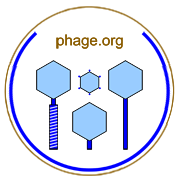

Phage type that is capable of giving rise to either productive infections, during some infections, or lysogenic infections at other times.
Upon infection a temperate phage must choose between reductive (lysogenic) and productive infections. Most temperate phages display lytic productive infections, though a minority instead release their phages chronically when productively infecting.
The choice point in infections by temperate phages is known as the lytic-lysogeny decision, reflecting the predominance of lytic rather than chronic phages among temperate phages as well as the characterization of the process in phage lambda (λ), a lytic, temperate phage. Conversion from a lysogenic to productive infection is described as induction.
Sometimes the phrase "lysogenic phage" is incorrectly used instead of "temperate phage" (bacteria are lysogenic, a.k.a., lysogens, not phages). The word "temperance" (noun) strictly can be used equivalently to the word temperate (adjective), referring in both case to a moderation in actions, where in phages this moderation presumably can be viewed in terms of a relative lack of anti-bacterial virulence.
This is the definition from Adams (1959), p. 442: "A phage capable of lysogenizing some fraction, often small, of the bacteria it infects."
From Guttman et al. (2005), p. 32: "The larger virulent phages generally encode many host-lethal proteins. Some of them disrupt host replication, transcription, or translation; they may also degrade the host genome, destroy or redirect certain host enzymes, or alter the bacterial membrane. The temperate phages, in contrast, generally do much less restructuring of the host, and they carry few if any host-lethal proteins that would need to be kept under tight control during long-term lysogeny. They always encode a repressor protein, which acts at a few operator sites to block transcription of other phage genes. This repressor may be the only phage-encoded protein produced during the lysogenic state, but often a few other genes that may be beneficial to host survival are also expressed from the prophages. The repressor also blocks lytic infection by other phages of the same immunity group—that is, other phages whose genes can be regulated by the same repressor. In this way, a temperate phage generally protects its host bacterium from infection by several kinds of phages."
For more on this topic, see Wikipedia, Google, and PubMed. Contact web master. Return to terms.